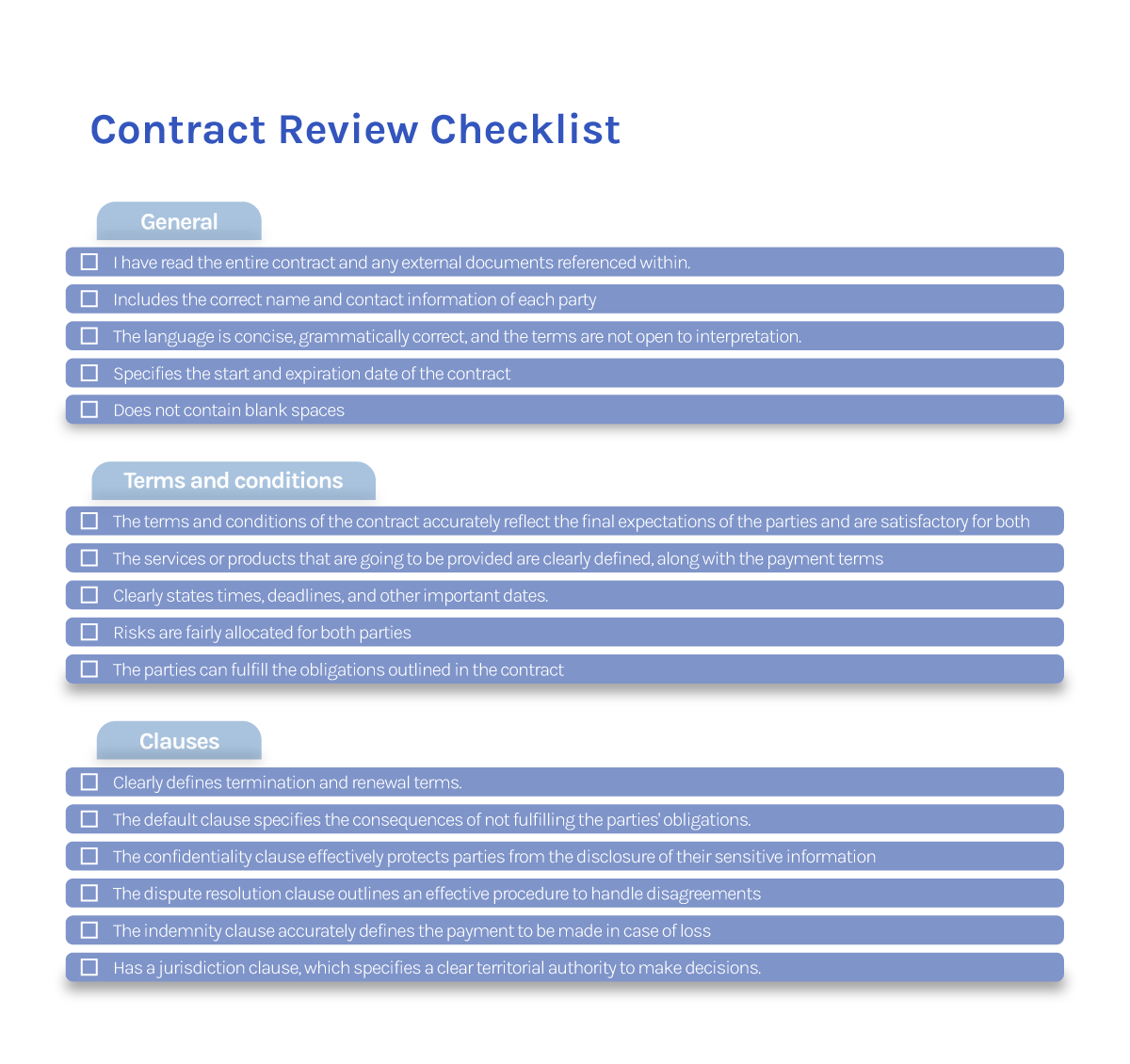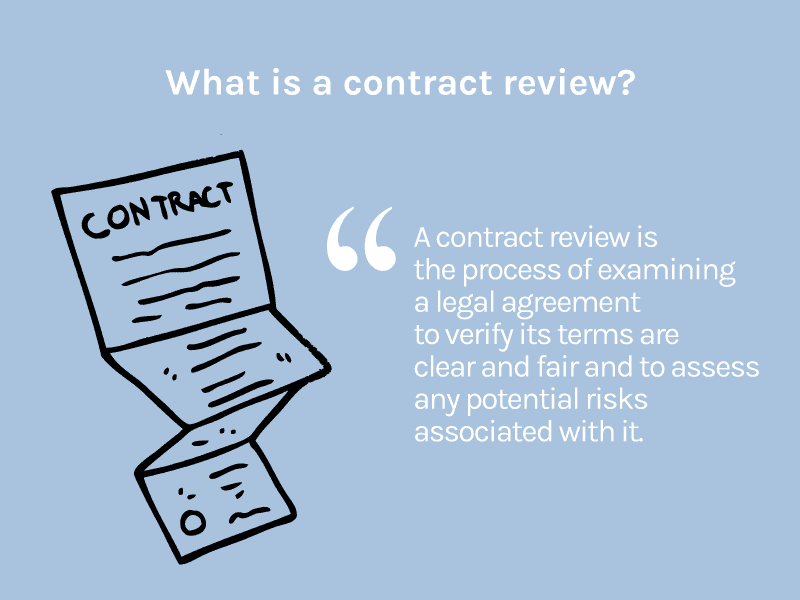What is a contract review?
A contract review is the process of thoroughly examining the key provisions of an agreement. The objective of a contract review is to confirm the enforceability of the contract and ensure it has fair and reasonable terms.
The review process may involve identifying potential risks and liabilities, recommending modifications, and negotiating changes that aim to protect the interests of all parties involved.
During a contract review, the following elements are evaluated:
- Clarity and accuracy of the terms
- Its potential to generate conflicts
- Whether the terms are beneficial
- Validity
- Rights and obligations of both parties
Reviewing a contract allows parties to assess whether their interests are protected and, in the event of containing unfair terms, parties can make suggestions and negotiate the contract for a more beneficial deal.
In a contract review, a lawyer examines the provisions of the agreement and highlights the terms that are most relevant for the client.
The attorney will summarize the key terms of the contract and ensure the client understands the consequences of entering the deal.
If the contract review occurs before the deal is closed, there is an opportunity to modify the contract at the best convenience of the client, share this new version with the counterparty, and negotiate a deal that satisfies all those who take part in it.
Why is it important?
A professional contract review is essential because it helps reduce the likelihood of disputes and other legal liabilities. A thorough review helps parties to identify risks associated with the contract and allows them to address any issue before being locked into a deal.
Signing a contract without being completely aware of its significance exposes a business or individual to commit to actions that will not be accompllished, which can lead to costly legal disputes.
Although best practices are pre-signature contract reviews, business owners can still ensure they have a clear understanding of the rules they must abide to and what actions they should avoid to be protected.
Prevent going to court
A skilled business attorney will pinpoint the provisions of a contract that may cause conflict in the future and put a business or individual at risk. The costs of litigation are considerably higher, in economic and personal terms, than those of a contract review.
Ensure all parties understand their roles
One of the most common causes of disputes is that parties are not aware of their responsibilities, and that can lead to an unintentional contract breach or even a lawsuit. With a contract review, both parties will clearly understand their duties and rights and abide by the agreed conditions.
Protect an investment
Since contracts can directly impact the commercial activity of a business, it is of the utmost importance to verify its reach and look out for any legal or financial risks involved with the transaction.
Who should review contracts?
Reviewing a contract involves, in the first place, for parties making a comprehensive reading of the document. However, since contracts contain complex legal language and clauses that are difficult to understand, it is recommended to ask for professional help.
Although a contract review can be performed by various professionals and even AI softwares, it is most recommended to resort to a business lawyer. A business can count with an in-house or hire an outsourced legal service to review its contracts.
An attorney will ensure your agreement is strategically coordinated with the objectives of your business, and that all potential liabilities are accurately addressed.
With an in-depth analysis of each provision of the contract, a lawyer will assess the risks and benefits, and work out a better arrangement, if necessary.
How long does it take to review a contract?
Depending on the complexity of the contract, a lawyer can take more than 5 days to review a contract. Despite the fact that AI softwares can take even minutes to carry out this process, only an experienced lawyer will analyze the different factors that impact the future of a business and tailor a specific solution to counteract any risk.
There are several factors that affect the time in which the contract review is delivered, such as the following:
- Complexity of the transaction or matter
- Contranct length
- The kind of language it uses
- Relationship between the parties of the agreement
Once the contract is reviewed and the lawyer suggests modifications, the counterparty will decide whether to move forward, or make an arrangement, until both parties reach to an agreement. The negotiation phase can take up to several weeks.
How to review a contract?
To ensure a contract serves your purposes, a lawyer will usually go through three stages of the contract review:
1. Pre-review
Before making a comprehensive examination of the contract, a lawyer will make a series of a questions to the client that will serve as a guide for the whole contract review process. This way, the lawyer will determine:
- What are the objectives of the business
- What is the relevance of the other party in the transaction
- What is the purpose of the agreement
- What are the expectations of business
With this information, the lawyer will ensure the agreement is aligned with the clients\’ vision.
2. Identify key provisions
Now that the lawyer is aware of the business’s objectives, the first step is to verify the enforceability of the contract. The attorney has to confirm the contract has the elements that make it legally binding, so that parties can take legal action in the event of a breach of contract.
Once this is verified, a lawyer will pay close attention to the key terms and conditions of the contract, and highlight the rights and duties of the parties, such as those concerning:
- Payment terms
- The quantity and value of the products or services that will be provided
- Commercial terms
- Duration periods
- Delivery dates
A lawyer will check the terms are not ambiguous or prone to be misinterpreted, and they are consistent throughout the whole document.
3. Evaluate risks
An effective contract review aims to foresee any risks involved and seek for strategies to mitigate their impact. This part of the process involves identifying core risks and disputes that may arise. Lawyers take special care to provisions concerning matters related to:
- Confidentiality provisions
- Regulation compliance
- Dispute resolution
- Limitation of liability
- Termination
- Renewal clauses
4. Making suggestions
After a thorough review process, the lawyer will communicate the client their rights and responsibilites, the risks implied, and what enhancements can be made.
The business lawyer will suggest strategical improvements that aim for the protection of the business, pursue its objectives, and ensure the contract is made in the most favorable terms for the client.
Contract review checklist

There are key elements of a contract that you should consider before entering an agreement, including:
1. General terms
Parties involved: The contract clearly establishes the individuals or businesses that are part of the deal and their contact information.
Dates: The period of validity of the contract is clearly specified, along with the timelines, deadlines and relevant dates. Ensure the dates align with your schedules.
2. Structure
Language: The terms are clear and they are not left to misinterpretation.
Similarly, a contract review examines the grammatic structure of the contract, such as the correct use of the language structure, including punctuation, spelling, or typos. An experienced lawyer will easily spot red flags and identify whether the deal is favorable for the client.
Blank spaces: Any areas that require attention and were not accurately covered? Using a contract template, although not recommended, is a common practice. Pay attention to blank spaces that were not correctly filled in.
Suitability: Are the terms reasonable? Are the expectations realistic?
3. Key terms and clauses
Representations and warranties: Representations are statements of fact that are true at the time they are made, while warranties are promises that certain conditions will continue to be true in the future.
Verifying the accuracy of the expectations that are set by each party is key, because this way they can have a clear understanding of what they are agreeing to and what each party is promising to deliver.
Contract defaults: Ensure you are aware of the implications of not abiding by the contract and the actions that will need to be taken if that occurs.
Renewal: Be aware on whether the contract can be automatically extended, and in what terms this can occur. Renewal clauses typically specify the length of the renewal term and the notice period required by the renewal.
Termination: The parties of a contract need to be mindful on their alternatives to opt-out from an agreement or the circumstances under which the contract can be terminated. Typically, a contract will be terminated in the event of a breach of contract or after the completion of the project outlined in the agreement
Confidentiality: Ensure the contract contains a provision that clarifies the treatment of the sensitive information that will be shared during the transaction. This clause should determine who will have access to specific information and how it can be shared.
Indemnification: Make sure the contract determines how one party will compensate the other for any harm or loss related to the transaction .
Dispute resolution: Defines how parties will solve disagreements and outlines the preferred resolution procedure. This provision is key to avoid unnecessary court proceedings and defines alternative dispute resolution mechanisms, such as conciliation, mediation, and arbitration.
Jurisdiction: The governing law under which the terms and conditions apply and in which courts the disputes shall be handled. If parties reside in different places, they both have to agree on which jurisdiction will rule the contract.
Risk allocation: The contract considers properly the extent to which the risks will be transferred to each party. A fair agreement should always aim for an even distribution of the risks.
Why is a lawyer your best choice for a contract review?
Lawyers offer a higher quality service for contract for a contract review because they have the legal expertise and knowledge to identify potential issues or risks that may not be obvious to non-lawyers.
Contrary to AI software or other professionals, hiring a lawyer is the best choice because only a contract review attorney has enough experience to:
- Accurately reflect the intentions of both parties
- Help negotiate any changes or modifications to better protect the interests of a business.
- Provide legal advice on the potential consequences of signing the contract.
- Help you prevent potential disputes or other legal issues
- Help you understand your legal rights and obligations under the agreement.
Overall, hiring a lawyer for a contract review can provide peace of mind and help protect your legal interests.


